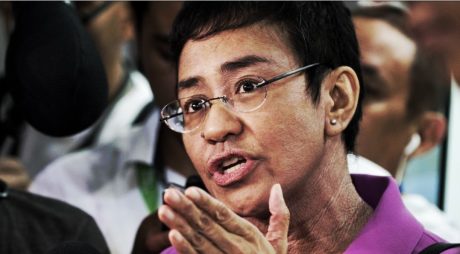
Let us talk about Rappler. Yes, the online news site that serves up content more like a well-oiled blogsite. There is a lot to be said about a supposed media company whose writers write more about themselves than the news itself. First, the organisation found itself in hot water and is now facing possible closure because the Securities and Exchange Commission (SEC) decided to revoke its license to operate after it found that it was “liable for violating the constitutional and statutory Foreign Equity Restrictions in Mass Media enforceable through rules and laws within the mandate of the Commission.”
One can say that Rappler’s legal predicaments could have been avoided had its CEO Maria Ressa spent more time doing her job behind the scenes, ensuring the company she is running complied with all the requirements to continue operating and less time doing media rounds overseas speaking against the current administration. That’s right. Ressa even travelled overseas to conduct speaking engagements to convince everyone who cared to listen that the press is being “undermined” under President Rodrigo Durterte’s government. It’s surprising that she didn’t expect Duterte or his supporters to get mad over what she was trying to do. It’s baffling why she is surprised at the backlash. She should know that Duterte enjoys a high popularity rating and understandably would get support from the public.
Ressa took advantage of her power and her connections in the media industry with the international community to spread her hate for Duterte’s style of leadership. You would be forgiven for thinking that damaging Duterte’s reputation with the goal of ousting him through another “people power” revolt or through international intervention to remove him became her top priority instead of delivering balanced news. That was too bad because she appeared shocked when the SEC found a reason to revoke their license. Ressa has since filed her appeal but one wonders why she didn’t see it coming. That says a lot about her leadership and people skills.
Ever since Rappler journalist Pia Ranada was banned from covering Duterte in Malacanang Palace as a consequence of the SEC decision, she and the rest of her colleagues have been crying persecution. Ranada claims Duterte is weakening democratic institutions:
I live in a society where a charismatic president is weakening democratic institutions. The critical press cannot afford to be cowed. We need to keep writing. We need to keep asking questions. We need to keep government on its toes.
I don’t know what the heck she is talking about but no one is stopping Rappler journalists like her from writing. Even when Rappler shuts down, their ex-employees can still write for other media outlets, blog sites or on social media. Duterte didn’t order them to stop writing. They are being such drama queens. Ranada’s statement is the kind that contributes to the loss of their credibility.
Journalists are also saying that black propaganda employed by the Duterte government reduced trust in media:
Melinda De Jesus, Center for Media Freedom and Responsibility executive director, said the “black propaganda” against journalists during the administration of President Rodrigo Duterte has affected public perception towards the media. (READ: Propaganda war: Weaponizing the internet)Journalists and newsrooms’ mistakes – from erroneous reports, misquoted sources, to bribery allegations – were magnified by government propagandists.
De Jesus’s statement is already proof that the public should take whatever media has to say with a grain of salt. We cannot swallow what they say hook, line and sinker. She did not provide evidence of her accusation that government propagandists are behind a negative propaganda against journalists. It’s as if she wants us to believe in her gut feel alone.

Online harassment is not exclusive to journalists particularly from Rappler. Some bloggers like me have been harassed by supporters of the Opposition for years but we never complained like spoiled brats. We ate trolls for breakfast.
I think it is time for some members of mainstream media to admit that political pundits online are giving them a run for their money. It’s not “black propaganda” that has reduced trust in media, it is their lack of substance. Rappler’s journalists for example think that they can inject opinion in their news reports. They should stick to facts when reporting news. They also have this mistaken belief that reporters should be adversarial. Ranada was a classic example of someone who, instead of showing respect for Duterte’s position, was antagonistic. Her questions addressed to Durterte were quite often loaded with insinuations. She should leave her opinions to columnists and political pundits. She probably needs more training as a journalist and a lesson in diplomacy. She acts with a strong sense of entitlement.
Nowadays, instead of writing the news, some journalists prefer writing about themselves and how they are victims of ordinary people online. I have yet to see them do an investigative report on issues like former Commission on Elections Chairman Andres Bautista’s escape to the United States to avoid prosecution involving his alleged hidden wealth. His case is very important to the health of Philippine democracy. He could have sold the votes of the people to the highest bidder.
Many of these kinds of journalists don’t see their own biases and slanted reporting so take it personally when others point it out. They are not the brightest people. They probably got so used to being revered before the advent of social media and before ordinary people saw through their crappy work. Rappler journalists in particular are good at calling attention to themselves. That is why they get trolled. Problem is, they can’t even tell if someone is just trolling them or not. They take everything seriously because they take themselves too seriously.
It is apparent that some members of the mainstream are not good at introspection. Instead of upping their game and improving their output, they would rather blame other people for loss in readership and for being called out on their erroneous reporting. The public they are blaming are still their customers. Somebody ought to tell them the customer is always right. If they are perceived to be biased, then there is basis in saying so especially in the case of Rappler who was never this “adversarial” towards the Aquino government.
No comments:
Post a Comment